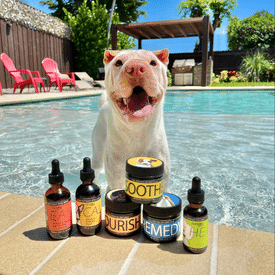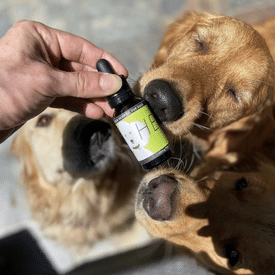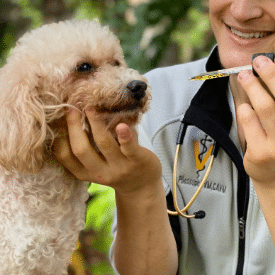Mushrooms for Dogs with Cancer

Medicinal Mushrooms have become a trending topic in the pet healthcare industry. Mushrooms for dogs with cancer sound magical (and they really are!), but understanding what they are, and how best to benefit from them takes a little more knowledge and scientific interpretation.
Table of Contents
What are Medicinal Mushrooms?
Medicinal Mushrooms are certain types of fungi that have medicinal (therapeutic) properties. Mushrooms are wonderful antioxidants, prebiotics, and full of vitamins and minerals. All medicinal mushrooms will have some sort of immune system benefit, but depending on the strain of the mushroom, they have unique properties that differentiate them from one another.
Medicinal Mushrooms contain special compounds called Beta-Glucans. Beta-Glucans, on a basic level, are polysaccharides. Polysaccharides are a form of soluble fiber found in many plants, bacteria, and fungi. Their therapeutic properties will vary depending on the plant they are derived from. Fungi, such as mushrooms, have some of the most potent beta glucans with medicinal properties.
Medicinal Mushrooms for Cancer in Dogs
Medicinal Mushrooms for dogs with cancer are a topic of interest and research continues to demonstrate their ability to fight cancer cells without harming the rest of the body. This is in stark contrast to drugs like chemotherapy, and treatments like radiation, that damage the body systemically while killing cancer cells. Mushrooms have the ability to spare healthy cells while destroying cancerous cells. In addition, if one is using a conventional therapy like chemo or radiation, mushrooms can still safely and effectively be used alongside these treatment options. They also lower the risk of recurrence (cancer coming back after being in remission).
Due to their adaptogenic and immune modulating power, it’s a given that there are benefits to medicinal mushrooms for dogs with cancer. However, certain mushrooms are proving to be more beneficial at targeting certain cancers than others. Here we will focus on 6 of the most common medicinal mushrooms and their cancer fighting benefits.
Turkey Tail Mushrooms for Cancer in Dogs
One of the most well-known and well-researched medicinal mushrooms for dogs with cancer is Turkey Tail, also called Coriolus or Trametes versicolor. Turkey Tail has a host of benefits that you can check out here, but for the sake of time, let’s just focus on its cancer fighting and cancer treatment benefits.
Turkey Tail is one of the few mushrooms for cancer with several in vivo studies (tested on actual people- not just isolated cells). Turkey Tail’s most potent benefit is its ability to disrupt and halt tumor growth. Coriolus Versicolor Polysaccaride (CVP) is a well known antitumor compound used in many clinical applications. It has been clinically shown to promote apoptosis in hepatoma (liver cancer) cells, as well as many other types of cancer cells. This includes breast cancer, lung cancer, as well as digestive cancers like collorectal cancer and gastric cancer.
Studies have been done comparing those who receive traditional treatment solely vs. those who receive traditional treatment PLUS Turkey Tail mushroom extracts, and the results always weigh in favor for those who used Turkey Tail in addition to their traditional therapies, both in success and survivability.
Turkey Tail also shown positive results when used alongside cancer therapies like chemo and radiation, and this has been proven in both humans and dogs alike. By working with the body and its immune system, Turkey Tail can not only lessen the negative effects of chemotherapy, but also boost chemo’s cancer killing ability. This makes it an ideal adjunctive therapy for anyone dealing with cancer.
Reishi Mushrooms for Cancer in Dogs
Reishi mushrooms (Ganoderma lucidum) and their sister mushrooms like Artist Conk have many wonderful benefits including the ability to alleviate stress, calm the nervous system and help improve sleep. Its cancer and tumor fighting abilities are just as powerful as others, and has been well researched, making it a great mushroom for dogs with cancer.
Due to Reishi’s triterpene content, reishi mushrooms have been shown to promote immunomodulatory and anti-tumor activities. Its polysaccharides have also been researched and proven to have antitumor effects as well, making it a powerhouse for shrinking and preventing cancerous growths. In addition, these studies have shown that reishi can prevent secondary cancers from occurring since it is so effective at isolating the original cancer and preventing further growth. This makes it crucial to stopping your dog’s cancer from spreading.
Similar to Turkey Tail, Reishi also can help your dog respond better to chemotherapy treatments. A study conducted by The Tang Center for Herbal Medicine Research showed that reishi has balancing effects that decrease the amount of drug-induced side effects like nausea and vomiting.
Adding Reishi mushrooms to your dog’s routine can be amazingly beneficial for preventing cancer and promoting a healthy immune response.
Lion’s Mane Mushrooms for Cancer in Dogs
Lion’s Mane Mushroom, also known as Hericium erinaceus, is a type of mushroom best known for its effectiveness in dealing with nervous system issues like cognition deficits, brain fog, and depression. However, it also has been shown to fight cancer by promoting a process known as apoptosis, which means it can eliminate mutated cells with dangerous cancer potential. Making Lion’s Mane another beneficial mushroom for dogs with cancer.
One of the compounds in Lion’s Mane, called Cerebroside E, has been researched and showed the ability to boost cancer apoptosis. As research continues to grow, Lion’s Mane has shown benefits for more specific forms of cancer. Lion’s Mane has the ability to stop certain cellular cycles and prevent additional mitosis of colon cancer cells by way of its polysaccaride complexes.
Another type of cancer Lion’s Mane has proven to be beneficial in fighting is Leukemia. Research on this mushroom and this form of cancer is still in its early stages, but an in vitro study on Lion’s Mane extracts and Leukemia has shown that Lion’s Mane promotes apoptosis in those leukemia cells.
Lion’s Mane has also shown promising early results in the fight against Breast Cancer. A study was recently performed on Lion’s Mane extract’s effects on estrogen receptor positive (ER+) human breast cancer cells, and was shown to be effective at reducing said cells.
Cordyceps Mushrooms for Cancer in Dogs
Cordyceps mushroom (Ophiocordyceps sinensis) is a finger like fungus often touted for its exercise and cardiac related benefits. That’s not its only benefit though. Due to its anti-inflammatory, anti-cancer and anti-tumor properties, Cordyceps has been shown to benefit those dealing with cancer.
Research has been done on cordyceps’ ability to promote autophagy and apoptosis in colon cancer cells and cervical cancer cells. It also has shown the ability to inhibit angiogensis (blood vessel formation) as well as promote apoptosis in those with malignant melanoma.
Cordyceps has also been researched for its lung cancer related benefits. It has long been used for its respiratory benefits dating back to ancient times, so it’s no surprise that it would have respiratory cancer benefits as well. For those dealing with Non-Small Cell Lung Cancer, cordyceps has been shown to promote cell levels of P53 and P21, two important genes responsible for proper cell division and growth.
Chaga Mushrooms for Cancer in Dogs
Although Turkey Tail seems to take the spotlight for its anti-cancer properties, Chaga can hold its weight right alongside Turkey Tail. Chaga mushroom (Inonotus Obliquus) has a lot of research behind it spotlighting some pretty outstanding cancer fighting benefits.
Chaga’s most notable cancer-fighting benefits seem to steer toward digestive cancers, like colon and gastric cancer. By extracting a certain compound, researchers were able to show that this Chaga mushroom compound inhibits a specific pathway responsible for cancer cell formation.
By means of the same pathway inhibition as colon cancer, Chaga mushrooms have also demonstrated the ability to promote apoptosis in hepatoma (liver cancer) cells.
New Research on Chaga Mushrooms for Bladder Cancer in Dogs
Recent research has explored the potential benefits of Chaga mushrooms for bladder cancer in dogs. The study conducted on dog bladder cancer organoids (DBCO) demonstrated that Chaga extract can inhibit cell viability, induce apoptosis, and arrest the cell cycle in a concentration-dependent manner. It also reduced the expression of bladder cancer stem cell markers and inhibited proliferation-related signals.
Furthermore, combining Chaga with conventional anti-cancer drugs enhanced their effectiveness. In animal experiments, Chaga administration led to a decrease in tumor growth and weight, suggesting its therapeutic potential. These findings highlight Chaga mushrooms as a promising natural supplement that could complement adjuvant chemotherapy, reduce adverse effects, and potentially limit recurrence and metastasis in dogs with bladder cancer.
Maitake Mushrooms for Cancer in Dogs
One of the lesser known mushrooms for cancer management is Maitake. Even though Maitake has been used for centuries in Asia, it has only recently become popular here in the US. Maitake mushrooms are wonderful adaptogens and immunomodulators to add into your dog’s routine. Maitake, like other medicinal mushrooms for dogs with cancer, has shown to have anti-tumor, anti-cancer, and antioxidant benefits.
Maitake has not only been shown to halt the growth and reproduction of cancer cells, but it has also been shown to increase the number of cancer fighting cells within the body. Even though it is lesser known, its benefits are no less powerful than the other medicinal mushrooms out there and is a valuable addition to your dog’s protocol.
Using Mushrooms for Dogs with Cancer: Nina’s Story

It is worth mentioning that when it comes to dosage, there are recommendations for certain conditions and ages of dogs, but the beauty of these amazing fungi is that they really can’t be overdosed.
When used in conjunction with cannabis products like Full Spectrum Hemp Extract, the two create a powerhouse cancer fighting combination that far surpasses any pharmaceutical option. This is due to these substances’ ability to work on several different cancer pathways. Conventional options like chemotherapy can only target one pathway at a time, unlike mushrooms for dogs with cancer.
Nina avoided these conventional options and survived a record amount of time despite all the push back from conventionally minded physicians. Nina never had to go through the pain of chemo and radiation, and enjoyed a wonderfully happy life on a protocol of cannabis, mushrooms, and a ketogenic raw diet.
Choosing the Best Mushrooms for Cancer in Dogs
We now understand all of the powerful cancer fighting and health boosting benefits of medicinal mushrooms for dogs with cancer! Unfortunately, just like hemp products, the market is saturated with poor quality products that make false promises. In order to choose a proper product that will provide health benefits, there are some things you need to look for.
First, make sure that the mushroom product you are choosing is fruiting body extract only. The fruiting body is the part of the mushroom that is seen above ground. This part of the mushroom is the part that yields the most potent, medicinal properties. If the product uses mycelium (the roots of the mushroom), it yields little to no medicinal benefits, and often contains large amounts of mold.
Second, a liquid extract is preferable to powdered products. Powdered products are not properly processed to extract the therapeutic properties of the mushroom, and should be considered more of a nutritional supplement rather than a medicinal one. Mushrooms need to go through a triple extraction process in order to pull out their medicinal components and make them as bioavailable as possible to your pet.
Third, where the mushroom is grown is quite important. Mushrooms that have real outdoor exposure will yield much higher and more potent benefits than ones grown in greenhouses under controlled conditions. Look for a wild harvested product, this will be a much better choice for you and your pet.
Related: Benefits of a Mushroom Extract Tincture for Pets
MycoDog Mushrooms for Cancer in Dogs

MycoDog’s Vitality mushroom extract tincture was designed to help support dogs dealing with cancer, autoimmune disease, liver issues and respiratory issues. A proprietary water extract of Turkey Tail, Reishi, Shiitake, Maitake, Chaga, Artist Conk and Red Belted Conk, with Astragalus Root and Ashwagandha preserved in organic, vegetable glycerin. However, any of MycoDog’s mushroom extract tinctures you choose will have anti-tumor and anti-cancer benefits, due to their carefully chosen mushroom extract and adaptogen blends. Additionally, rotating the three tinctures can be hugely beneficial to your pet, for maintenance and proactive health advantages.
Final Thoughts
Medicinal Mushrooms are one of the many gifts this earth has given us in managing and preventing many health conditions. Additionally, the benefits of medicinal mushrooms for dogs with cancer are incredible, and we continue to learn more as we continue to study the power of these fungi as a holistic tool for healing.
While they may not have as much in vivo research in pets as we would like, we can safely assume that the benefits shown by the plethora of research, coupled with the acceptance in even conventional medical circles, can be passed on to our pets as well as ourselves. I wholeheartedly believe every pet should be consuming medicinal mushrooms as part of their proactive health regimen.















